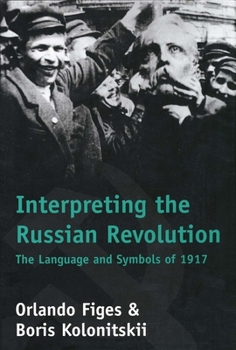Interpreting the Russian Revolution: The Language and Symbols of 1917
Select Format
Select Condition 
Book Overview
This is the first book in any language to offer a comprehensive analysis of the political culture of the Russian Revolution. Orlando Figes and Boris Kolonitskii examine the diverse ways that language and other symbols - including flags and emblems, public rituals, songs, and codes of dress - were used to identify competing sides and to create new meanings in the political struggles of 1917. The Revolution was in many ways a battle to control these...
Format:Hardcover
Language:English
ISBN:0300081065
ISBN13:9780300081060
Release Date:October 1999
Publisher:Yale University Press
Length:208 Pages
Weight:1.00 lbs.
Dimensions:0.9" x 6.4" x 9.5"
Related Subjects
Education & Reference Europe History Modern (16th-21st Centuries) Revolutionary Russia WorldCustomer Reviews
2 ratings
Orlando Figes doesn't sound Russian ... BUT...
Published by Thriftbooks.com User , 15 years ago
Orlando Figes doesn't sound like the name of a Russian hostorian... but ... don't let than fool you. This book ("Interpreting the Russian Revolution: The Language and Symbols of 1917") is the second of Figes's books about the Russian revolution that I have read. The author does an outstanding job drilling into the details and developing 'the backstory' that provides the real color of the events and makes this timespan extremely interesting.
Very interesting book with some flaws
Published by Thriftbooks.com User , 20 years ago
This book by Orlando Figes and Boris Kolonitskii examines how language and symbols were used in and influenced the course of the Russian revolution. The book is particularly good examining how rumors circulated around Petrograd and Russia about the Imperial family, especially a supposed relationship between the Tsarina and Rasputin and how they undermined the people's confidence in the Tsar. The book is also very good in examining how symbols and words meant different things to different segments of Russian society, and how the Bolsheviks specifically avoided trying to publically define what each symbol and word meant to them, and therefore let the population believe that whatever they defined something as, the Bolsheviks believed that too and supported it. Figes and Kolonitskii at the end of the book detail how this tendency to let people define something for themselves led to many people defining certain words quite broadly, which led to reprisals against certain people that were defined as too rich or too educated that even the Bolsheviks would not have condoned. Unfortunately, this book does have some methodological problems. At certain points, Figes supports his argument with nothing more than a citation from his own book, which is a highly dubious practice in scholarly works. The book also in its opening chapter on rumors, doesn't make clear that specific factual evidence of how widespread rumors about the Imperial family is only published evidence from AFTER the February 1917 revolution. The authors assume that because this explosion of anti-Imperial literature occured right after the Tsar was deposed, it must have been wide spread via word of mouth before February 1917. It's a reasonable assumption, but they don't support it well, and also do not make it clear that this published evidence comes after February 1917, not before. Otherwise however, this is a very good book and extremely readable, unlike other works of the post-moderism genre.






